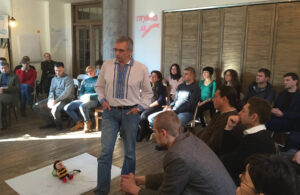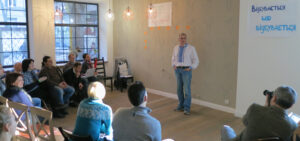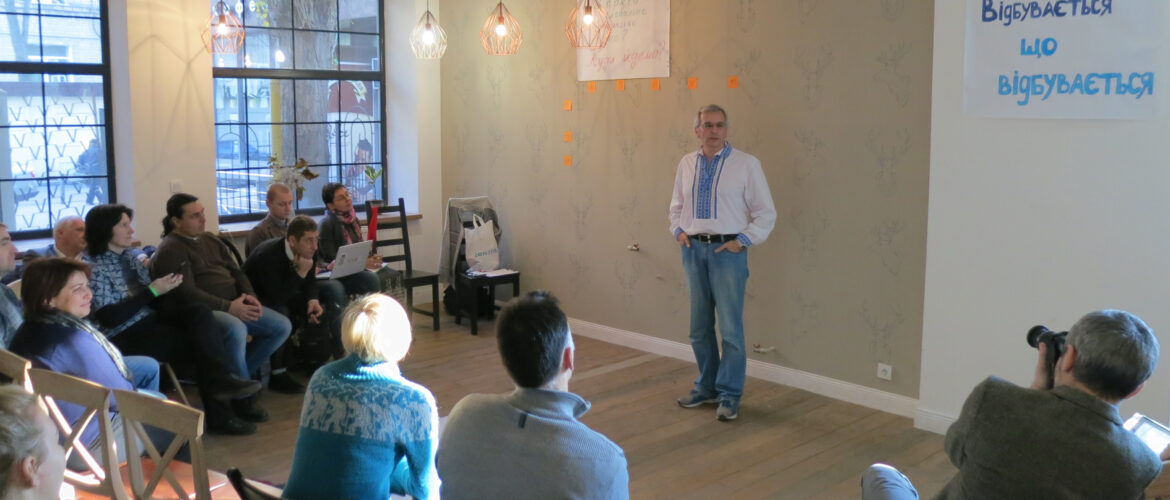Open Space is a technology for holding productive meetings in groups of five to 5,000 people (maybe more, but I haven’t heard of anyone trying it), created by Harrison Owen in 1985/6. It is characterized by purposefulness, diversity, freedom, responsibility and self-organization of the participants.
Open Space technology has been successfully applied in more than 100 countries for the development of new products and training programs, exchange of experiences, interdisciplinary research, conflict resolution and conferences. It has been used by the largest government, public and commercial organizations such as US West, TransNet, Boeing and AT&T, etc. And I, personally, used it for both large and small organizations and groups, and with definitely useful results!
Specifics
 Open Space technology is effective where more traditional meeting formats fail. Where there are conflicts, complex and poorly structured tasks, heterogeneous audiences and lack of time to make a decision. It is based on the philosophy of taking responsibility for what is really important to you.
Open Space technology is effective where more traditional meeting formats fail. Where there are conflicts, complex and poorly structured tasks, heterogeneous audiences and lack of time to make a decision. It is based on the philosophy of taking responsibility for what is really important to you.
Open Space technology allows for rich and useful communication during the entire event, provided that all participants are interested in obtaining a result. That is why I constantly insist that only those who are really interested in the topic of the meeting, and not “dead souls” for the sake of a “check mark”, be invited to the event, which is held using Open Space technology.
Although, if such people get into the Open Space, then either they “come to life” thanks to the principles, atmosphere and law of VP and get involved in the discussion, or they quickly disappear.
“Open Space runs on passion, bounded by responsibility and fueled by freedom“. I can’t even remember who described this wonderful technology so aptly and poetically!
The holding of the Open Space is determined by the existence of an important and relevant issue for the organization or community. This question should address an urgent, hot, sometimes controversial issue that may contain potential conflict. To find a solution or an answer to a question, it is useful to involve parties with different interests and from different structural links of the organization or community.
 The meeting in the Open Space format does not have a fixed program, does not include pre-prepared expert speeches and presentations. There are no regalia, titles, or positions during the Opening Space.
The meeting in the Open Space format does not have a fixed program, does not include pre-prepared expert speeches and presentations. There are no regalia, titles, or positions during the Opening Space.
Participants themselves take responsibility for the course and results of the event. During the first two hours, the participants formulate the agenda with the help of a facilitator. Initial resistance or uncertainty, which may arise from the unfamiliarity of the format, gradually disappears, participants become more relaxed, focus more on content than on form, reveal their potential and are ready to join teams, initiate new topics, ideas and take on responsibility for their implementation.
A group of 100 participants initiates, on average, 20-30 topics within the central topic of discussion. The results of the discussions during the Open Space are documented, and at the end of the event, each participant receives a book containing the minutes of all discussions with the contacts of the initiators of the discussions.
The duration of the Open Space event can be from 4 hours to 3-5 days. Depends on the number of participants and tasks.
The venue must meet certain requirements: the ability to gather all participants in a wide circle or semi-circle (it is possible in several rows), the ability to organize a “wall/board of offers”, the opportunity for participants to disperse into the required number of small groups to discuss the proposed offers and the equipment of these places necessary materials, the opportunity to have a snack with fruits, vegetables, drinks.
Appropriateness criteria for the use of Open Space technology.
Harrison Owen, author of Open Space Technology, explains that his approach works best when the following criteria are followed:
- They are going to consider a real problem, the solution of which is not yet available and it needs a deepening of its understanding or expected results.
- The variety of involved participants necessary to solve the problem and their interest in obtaining the result.
- The presence of a real or potential conflict that affects the participants of the discussion and makes them indifferent.
- The urgency of solving the central issue (“it was necessary to act yesterday”).
Principles
Happening – what is happening. That is, what happens is what you want to happen, or you allow it to happen if you do nothing to change the situation. When you are not satisfied with something, or do something to change the situation, or change your attitude towards it, accept it as it is. This is about responsibility and awareness of one’s capabilities.
We start when it starts. That is, although we have time frames, for example, the beginning and end of discussions in groups, but you can start work when you feel that you are ready to start, and it is not necessary to wait for someone else (if you have not previously agreed on this , of course), or start exactly at the appointed time, if you are not yet ready to start the discussion and you still need to settle something. Others can start it for you, for example, if you so wish.
There are those who are. That is, everyone who has already come to you for a discussion is exactly the people who at the moment are most interested in participating and it is with them that it is useful to discuss everything, and not to miss those who are not there or to wait for someone who may not be with ‘show up, even if he/she is a known expert on the topic of discussion.
Even if it happens that you will be the only person in your group, it is not a reason to get upset and finish the work! Work independently: record your ideas in the minutes, because you may be the only and best expert or interested person on the topic of discussion right now and right here. It’s always nice to chat with an interesting person!
We finish when it ends. That is, if the topic is exhausted and there is still time, there is no need to wait for something else, but you can finish the discussion (be sure to write everything down in the minutes!) and enrich other groups with your presence, or take a rest. At the same time, if the time has already run out and the topic has not yet been discussed, you may not interrupt the discussion, but agree to continue the discussion in another place, because, according to the plan, your place may be occupied by another discussion group, but this will not be an obstacle to continuing your exchange of ideas and thoughts!
The law of “two feet” or freedom of movement states your right to move from group to group freely, but without disturbing others, if you feel the need to do so. When you feel that you have already said or clarified everything, then calmly leave the group to discuss the topic further, and you yourself go to another place, or to places to strengthen your strength with drinks and snacks or to rest!
Remember! You can freely change your state from an energetic worker bee to a beautiful carefree butterfly and vice versa! Both of these creatures are important in Open Space, and even more important is the ability to transform from one to the other. In accordance with your inner state!
Call “Be ready for the unexpected!” adjusts to openness and creativity, acceptance of different points of view and search for original solutions. Even from the unexpected side.
Conducting scheme
- Opening circle, opening speech of organizers, presentation of facilitators
- Explanation of Open Space principles and law, warnings, metaphorical creatures, technical details
- Nominating proposals for discussion, filling the board/wall of proposals
- “Market” – time for discussion and awareness of topics, registration for visits
- Work of discussion groups, keeping minutes of meetings/discussions
- Acquaintance with the results of the groups’ work
- Planning next steps
- Final round, reviews
Use Open Space Technology to achieve better results, unite your team, identify informal leaders, nurture initiative, self-organization and responsibility in your organization!
Get in touch! We are always ready to reveal to you all the possibilities and acquisitions of Open Space technology!

